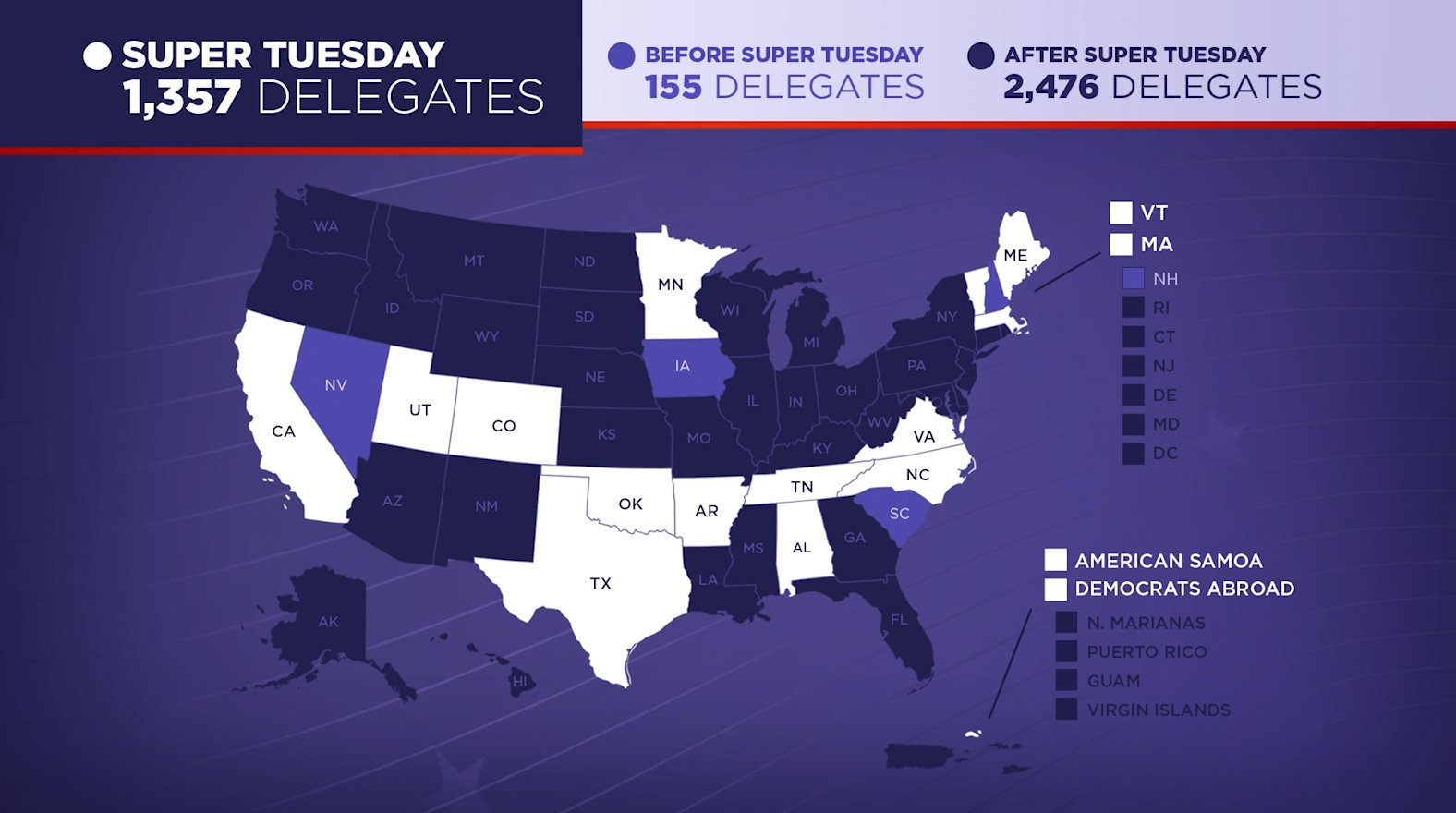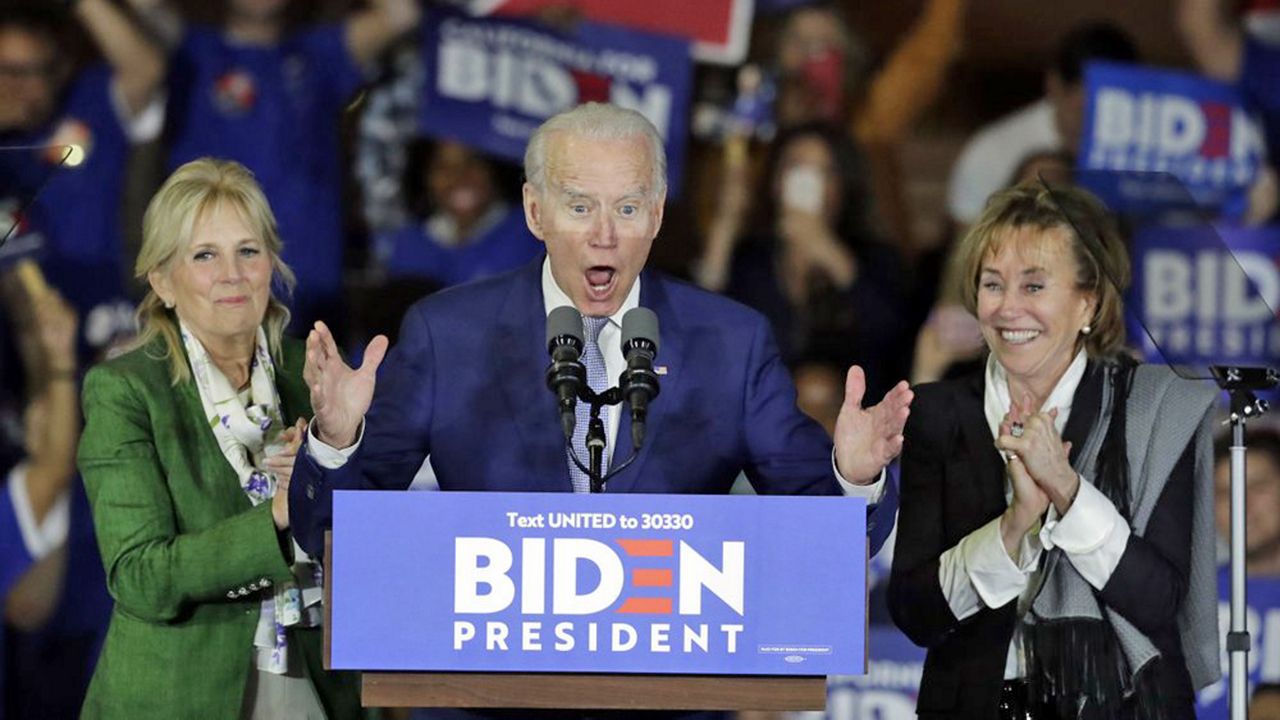NATIONWIDE — Joe Biden was a big winner on Super Tuesday as the former vice president won several states in the Democratic primary.
- 14 states, American Samoa head to the polls for primaries, caucuses
- States with biggest number of delegates are Texas, California
- Florida's presidential preference primary is March 17
- Related: Here's What Happens to the Votes for Candidates Who Drop Out
- 2020 ELECTIONS: Latest news, races and candidates in your area, election calendar, and more
Both Biden and U.S. Sen. Bernie Sanders both picked up delegates as returns from some states are still coming in.
However, it was a disappointing night for the billionaire and former New York City mayor Michael Bloomberg and U.S. Sen. Elizabeth Warren.
To get the democratic nomination for president and take on President Donald Trump this November, a Democratic candidate must earn 1,991 delegates.
Many of those delegates were up for grabs during Super Tuesday.
Election returns are still coming in in several states, especially California where polls did not close until 11 p.m. EST
But here is an update as of Wednesday afternoon:
- Biden: 382
- Sanders: 321
- Warren: 25
- Bloomberg: 9
- U.S. Sen. Tulsi Gabbard: 1
#SuperTuesday results as of 7am ET Wednesday, per @AP:@JoeBiden:
— Taylor Popielarz (@TaylorPopielarz) March 4, 2020
—Alabama
—Arkansas
—Virginia
—Massachusetts
—Minnesota
—North Carolina
—Oklahoma
—Tennessee
—Texas@BernieSanders:
—California
—Colorado
—Utah
—Vermont @MikeBloomberg:
—American Samoa
Still not called:
—Maine
Sanders had a slight lead in the delegate count going into Super Tuesday, so for Biden, it was a major comeback.
After coming in fifth in one primary leading up to Super Tuesday, Biden turned his presidential hopes around.
"I'm here to report … we are very much alive!" he said to a roaring crowd.
Biden clearly carried momentum from his big win in South Carolina over the weekend into Super Tuesday, winning the most Super Tuesday states — including Texas. He won at least eight states while Sanders captured four.
Both had quite the political victory compared to Bloomberg and Warren, who were teetering on the edge of viability. Warren finished in an embarrassing third place in her home state, and Bloomberg planned to reassess his candidacy on Wednesday after spending more than a half billion dollars to score a single victory — in American Samoa.
Biden says the country needs a president who can fight — but also unite.
"We cannot have a never-ending war between the parties. We need a person who can fight, but make no mistake about it: I can fight. But we need as badly someone who can heal," the 77-year-old Biden said.
Sanders also won several states, picked up many delegates — and is not backing down.
"I tell you, with absolute confidence, we're going to win the Democratic nomination. And we are going to defeat the most dangerous president in the history of this country," the 78-year-old Democratic socialist said.
A disappointing night for Warren, who won no states and came in third in Massachusetts, where she is the senior senator. She is still in the race, for now.
"Cast a vote from your heart. And vote for the person you think will make the best president of the United States of America," said Warren.
Bloomberg spent hundreds of millions of dollars in advertising. However, those ads did not translate to votes.
"In just three months we've gone from 1 percent in the polls to being a contender for the Democratic nomination for president," said Bloomberg.
And with their disappointing results on Super Tuesday, Warren and Bloomberg may be re-evaluating their plans in the coming days.
Right now, it appears Biden and Sanders will be battling it out as we approach more primary contests – including Florida's on March 17.

Although Super Tuesday will not necessarily determine who wins the nomination, it has historically been difficult for a candidate who performs poorly on the day to recover.
Here is a look at Tuesday's contests: Fourteen states hold primaries on Super Tuesday, including California and Texas, the two biggest delegate hauls of the entire primary season. California offers 415 delegates and Texas 228. In total, more than 1,300 delegates will be up for grabs, about a third of the total available in the race to the Democratic presidential nomination.
Although Super Tuesday was originally created as a regional primary featuring Southern states, it has morphed over the years. This year, it includes states from every region of the country.
The other states participating are Arkansas, Alabama, Colorado, Maine, Minnesota, Massachusetts, Vermont, Utah, North Carolina, Virginia, Tennessee, and Oklahoma. Most of the Southern states are Republican strongholds in the general election, while others, such as California, are solidly Democratic. North Carolina is likely to be a battleground state in the general election.
The Super Tuesday states are home to diverse electorates, both when it comes to demographics and political ideology.
In California and Texas, white voters make up less than half the population. Latinos count for almost 40 percent of the populations in both states. California, meanwhile, has the nation’s highest Asian population at roughly 15 percent. North Carolina, Tennessee, Virginia, Alabama, and Arkansas have large populations of black voters, one of the Democratic Party’s core voting blocs.
The states blend a mix of urban and rural voters, as well as Democrats from all sides of the political spectrum. As candidates focus on wooing Southern Democrats in states like Texas and Arkansas, they must also be thinking about a message that can resonate in progressive San Francisco.
The Associated Press contributed to this story.



